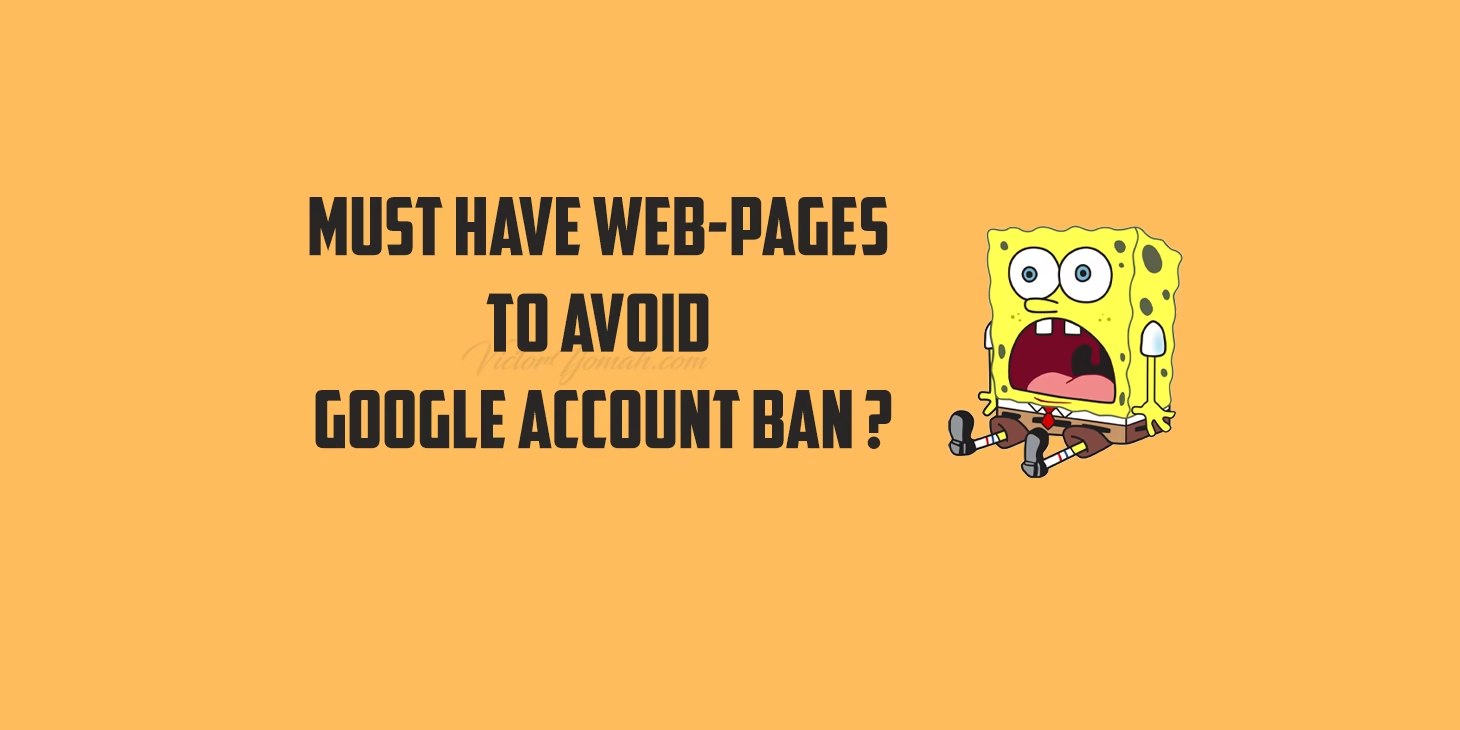Hello, blogger! If you’re reading this, you’re probably trying to make money through AdSense or ADX arbitrage, buying traffic at a lower cost and earning more from ad impressions. It’s a great strategy when done right, but let’s be honest: Google has been cracking down hard on arbitrage sites lately.
I’ve seen too many publishers lose their accounts overnight because they missed some crucial pages on their websites. It’s frustrating when your income disappears because of something that could have been easily fixed.
The truth is, Google expects certain pages to exist on your site before they’ll approve your account or keep it active. These aren’t just “nice-to-have” pages; they’re absolutely essential if you want to avoid that dreaded “Your account has been suspended” email.
In this guide, I’ll walk you through the most important pages you need on your website. I’ll cover the basics that everyone knows about, but I’ll also reveal some of the lesser-known requirements that Google looks for (and that most publishers miss until it’s too late).
While I can’t cover all 33 critical pages in this free article, I’ll share the most fundamental ones to get you started on the right path. For the complete roadmap to a fully compliant and profitable arbitrage site, you might want to check out my comprehensive ebook later.
Let’s dive in and make sure your site stays in Google’s good graces!
Why You Should Listen to Me
Before we dive into the nitty-gritty of these essential website pages, you might be wondering: “Who is this person, and why should I trust their advice?”
Fair question! I’ve been in your shoes and have navigated the complex world of online publishing for over 10+ years. My journey started in the early days of wapka.mobi, where I built my first website using nothing but a Nokia 3110c phone. Yes, you read that right; a basic phone with a tiny screen. If I could make that work, trust me, you can succeed with the tools you have today.
My foundation comes from studying Mathematics and Computer Science at the University of Delsu, which gave me the analytical skills to understand how algorithms work. Later, I completed my Masters in Digital Marketing at the University of Chester – consistently ranked as the UK’s top university for business education.
But theoretical knowledge only gets you so far. I’ve invested thousands of hours in practical training through courses from McKinsey, HubSpot, Google, Meta, and countless other platforms. This combination of academic knowledge and hands-on experience has helped me stay ahead of Google’s ever-changing policies.
Unlike many advisors in this space, I’ve never had an AdSense account suspended or closed. I’ve maintained a perfect compliance record throughout my career by implementing the exact strategies I’m about to share with you. This isn’t about recovery tactics – it’s about prevention and building sites the right way from the start.
For a more detailed look at my background and journey, feel free to check out my [About Me page]. What matters most is that I’m not sharing theoretical advice – I’m sharing battle-tested strategies that actually work in today’s challenging AdSense environment.
Now, let’s get into those essential website pages that will keep your account safe and your income flowing.
Essential Pages for Google AdSense & ADX Arbitrage
1. Homepage
Your homepage is like the front door to your website. It’s often the first thing both visitors and Google’s reviewers see, making it incredibly important for AdSense and ADX arbitrage sites.
When running arbitrage, your homepage needs to clearly show that you’re running a legitimate content site – not just a page designed to trick visitors into clicking ads. Google’s policies specifically target sites that lack substantial original content or provide little value before showing ads.
Here’s what your homepage must include:
- Clear Navigation Structure: Make sure visitors can easily find their way around your site. Include a clean menu with links to your main content categories, as well as links to important pages like About Us, Contact, and Privacy Policy. This signals to Google that you’re running a real website with depth.
- Content Preview Section: Display snippets or thumbnails of your best or most recent content. This shows visitors what your site is about and gives them places to click besides ads. For arbitrage to work without triggering policy violations, you need to demonstrate that you’re offering something of value.
- About Your Site Section: Include a brief paragraph explaining what your site covers and who it’s for. This helps establish legitimacy and gives context to your content. Google wants to see that you have a clear purpose beyond just displaying ads.
- Minimal Initial Ads: While it might be tempting to pack your homepage with ads, this is a major red flag for Google. Your homepage should prioritize content discovery over monetization. Save your heavy ad placements for your content pages where users are actually consuming information.
- Mobile Responsiveness: Ensure your homepage looks good and functions well on all devices. Many arbitrage publishers focus only on desktop or only on mobile, but Google checks both. A poorly designed mobile homepage is a common reason for account review.
- Loading Speed: Optimize your homepage to load quickly. Slow-loading pages with too many ad scripts are frequently flagged during AdSense reviews. Use Google’s PageSpeed Insights to check your performance and make necessary improvements.
Remember, your homepage sets the tone for your entire site. If it looks like a low-quality ad farm, Google will treat your entire operation as such. A professional, content-focused homepage is your first line of defense against account issues.
2. Privacy Policy
Let’s talk about your Privacy Policy – it might seem like just another boring legal page, but for AdSense and ADX arbitrage, it’s actually a make-or-break requirement.
Google won’t even approve your account without a proper Privacy Policy, and they regularly check to make sure it stays updated. Why? Because it’s about transparency with your visitors about how you’re handling their data.
Here’s what your Privacy Policy absolutely must include:
- Data Collection Disclosure: Clearly explain what information you collect from visitors. This includes obvious things like names and email addresses, but also the not-so-obvious stuff like IP addresses, browser information, and cookies. For arbitrage sites, you’re collecting a lot of data for targeting, so be thorough here.
- AdSense/ADX Specific Language: You need to explicitly mention that you use Google AdSense or Google Ad Exchange on your site. Google actually checks for their name in your policy! Include language about how these services use cookies to serve personalized ads based on previous visits.
- Third-Party Ad Networks: If you’re doing serious arbitrage, you might be using multiple ad networks. List every single one that you use on your site. Leaving any out can trigger compliance issues during a review.
- User Rights Section: Detail what rights visitors have regarding their data – including how they can opt out of personalized advertising. This is especially important if you get traffic from Europe (GDPR) or California (CCPA).
- Cookie Usage: Explain how and why you use cookies, including those set by advertising systems. For arbitrage sites that rely heavily on retargeting, this section needs to be particularly detailed.
- Updates and Changes: Include information about how you’ll notify users of any changes to your privacy practices. This shows Google you’re committed to ongoing compliance.
Contact Information: Provide a real way for users to contact you with privacy concerns or questions. A non-working email address here is a huge red flag during AdSense reviews.
The key with your Privacy Policy is that it needs to be comprehensive yet accessible. Don’t just copy and paste a template without customizing it for your specific site and practices. Google’s reviewers can spot generic policies from a mile away, and they often trigger manual reviews.
Your Privacy Policy needs to reflect what you’re actually doing on your site. If you claim you don’t collect certain data but your ad setup indicates otherwise, that inconsistency can lead to account issues.
3. Terms & Conditions
Your Terms & Conditions page (sometimes called Terms of Service or Terms of Use) isn’t just legal jargon – it’s another critical element for your AdSense or ADX arbitrage site that Google specifically looks for during reviews.
Think of your Terms & Conditions as the rules of your website. Without clear rules, Google worries that your site might be hosting problematic content or engaging in activities that violate their policies.
Here’s what you need to include in your Terms & Conditions for a compliant arbitrage site:
- User Agreement Language: Start with clear language establishing that by using your site, visitors agree to abide by your terms. This creates a legal foundation for everything else on the page.
- Content Usage Rules: Explain how visitors can and cannot use your content. For arbitrage sites, you need to prohibit scraping or automated access to your pages, as this helps demonstrate to Google that you’re not enabling click fraud.
- Prohibited Activities: Clearly outline behaviors that aren’t allowed on your site, such as attempting to manipulate ads, using bots, or engaging in any activity that might violate Google’s policies. This shows Google you’re actively working to maintain a quality environment.
- Intellectual Property Rights: Include information about your copyright claims and how others can or cannot use your material. This helps establish that you’re running a legitimate content operation, not just aggregating others’ work.
- Comment/User Content Rules: If your site allows comments or user-generated content, detail your policies regarding what’s acceptable. Google checks to ensure you have mechanisms to prevent policy-violating content.
- Account Termination Conditions: If users can create accounts on your site, explain when and why you might terminate those accounts. This demonstrates your commitment to maintaining content quality.
- Limitation of Liability: Include standard legal language that limits your liability for various scenarios. This is not just legal protection for you but also signals to Google that you’re operating as a legitimate business.
- Changes to Terms: Mention how and when you might update your terms and how users will be notified. This shows ongoing site maintenance, which Google views favorably.
The Terms & Conditions page is one that many arbitrage publishers create once and forget about. But Google actually checks to see if this page is accessible from throughout your site and whether it appears to be regularly maintained.
A well-crafted Terms & Conditions page not only helps keep your AdSense account in good standing but also protects you legally if issues arise with site visitors. Don’t cut corners here – it’s worth taking the time to create a comprehensive, site-specific document.
4. Cookie Policy
Even though some elements of cookie usage are covered in your Privacy Policy, Google now expects AdSense and ADX publishers to have a dedicated Cookie Policy page. This is especially important for arbitrage sites since you’re likely using multiple tracking and advertising cookies.
Let’s break down what your Cookie Policy needs to include to keep your account safe:
- What Cookies Are: Start with a simple explanation of what cookies are and how they work. Remember, not all your visitors are tech-savvy. Something like “small text files stored on your device that help our website remember information about your visit” works well.
- Types of Cookies You Use: List out the different types of cookies on your site, such as:
- Essential cookies (required for site functionality)
- Preference cookies (remember user settings)
- Analytics cookies (track how people use your site)
- Advertising cookies (the ones AdSense and other networks use)
- Third-Party Cookie Information: This is crucial for arbitrage sites! Name every advertising service that places cookies through your site. Yes, this includes Google AdSense/ADX, but also any other networks you’re using or any tracking pixels from traffic sources.
- Cookie Duration: Explain how long each type of cookie remains active. Some might be session cookies that disappear when the browser closes, while others might last for months. Google wants to see that you’re being transparent about this.
- Cookie Control Options: Detail how visitors can manage cookies through their browser settings. Include instructions for disabling cookies and what parts of your site might not work properly if they do so.
- Consent Mechanism: Describe how users can give or withdraw consent for non-essential cookies. If you’re getting European traffic, you need a cookie consent banner that actually works – not just for show.
- Cookie Policy Updates: Mention how you’ll notify users when your Cookie Policy changes. This shows Google you’re maintaining your site and keeping up with policy requirements.
For arbitrage sites, your Cookie Policy is especially scrutinized because you’re operating in a space where user tracking is intensive. Having a vague or incomplete Cookie Policy is one of the quickest ways to trigger a manual review.
And here’s a tip many publishers miss: Make sure your Cookie Policy is consistent with your actual cookie usage. Google can detect if your site is setting cookies that aren’t disclosed in your policy, which raises red flags about transparency.
Your Cookie Policy should be easily accessible from every page of your site, typically through a footer link. This keeps you compliant not just with Google’s requirements but also with various international privacy regulations.
5. Contact Us
Your Contact Us page might seem simple, but it’s actually one of the most scrutinized pages during AdSense and ADX reviews. Many arbitrage sites get flagged because they either don’t have this page or have one that’s clearly non-functional.
Here’s why this page matters so much: Google needs to know there’s a real person or company behind the website who can be held accountable for the content and ad placements. For arbitrage operations especially, they want to ensure you’re not just running a faceless click farm.
Let’s look at what your Contact page must include:
Multiple Contact Methods: Don’t just put an email address and call it done. Include at least 2-3 different ways people can reach you. This typically means:
- A contact form that actually works
- A real email address (not just a generic service)
- A physical address (even if it’s a P.O. box)
Response Time Expectations: Let visitors know how quickly they can expect to hear back from you. This shows Google you’re actually monitoring communications, not just pretending to be available.
Business Hours: If applicable, include when your team is available to respond. This adds another layer of legitimacy to your operation.
Contact Person/Department: For larger sites, specify who handles different types of inquiries (support, advertising, content, etc.). This demonstrates organization and professionalism.
Location Information: Even if you don’t want to share your exact address, at least include your city and country. Google often checks if your location information matches what they have on file for your AdSense account.
Social Media Links: If you have legitimate social profiles for your site, include links to them. This creates additional verification points that you’re running a real content business.
GDPR/CCPA Compliance Note: Add a brief note explaining how contact information submitted through the page will be handled, with reference to your Privacy Policy. This keeps you compliant with international regulations.
Here’s what many arbitrage publishers miss: Google actually tests contact forms during manual reviews. If they submit a test message and it bounces or goes unanswered, that can trigger account issues. Make sure your contact form works and that you’re checking the inbox it sends to.
Your Contact Us page signals to both Google and your visitors that you’re running a transparent, accessible operation. For arbitrage sites that are already under extra scrutiny, this page needs to be particularly well-implemented. Don’t treat it as an afterthought – it could be the difference between keeping your account active or facing a suspension.
6. Disclaimer Page
While most arbitrage publishers focus on the obvious requirements like Privacy Policy and Terms, your Disclaimer Page often flies under the radar – but Google is increasingly checking for it during reviews.
This page is crucial because it establishes transparency about your content and advertising relationships, which is particularly important for arbitrage sites where the line between content and monetization can be blurry.
Here’s what your Disclaimer Page must include:
Content Accuracy Statement: Clearly state that while you strive for accuracy, your content may contain errors or become outdated. This protects you legally while also signaling to Google that you take content quality seriously.
Financial Disclosure: Explain how you make money from the site, specifically mentioning advertising relationships. For arbitrage operations, be transparent that you earn revenue from ad displays and clicks.
Non-Professional Advice Notice: Include language clarifying that your content isn’t professional advice (medical, financial, legal, etc.) unless you have proper credentials. Google is increasingly strict about this, especially for YMYL (Your Money, Your Life) topics.
External Links Disclaimer: State that you’re not responsible for third-party websites linked from your content. This is particularly important for arbitrage sites that may link out to various sources.
Endorsement Clarification: Specify whether product mentions or reviews constitute endorsements. Google wants to see clear distinction between editorial content and promotional material.
Your Disclaimer Page demonstrates to Google that you’re running a legitimate operation with appropriate disclosures. Many arbitrage sites get flagged because they focus only on the “big three” legal pages while neglecting this crucial element.
7. Modern Slavery Statement
Here’s one that might surprise you – a Modern Slavery Statement is becoming increasingly important for AdSense and ADX publishers, especially those operating arbitrage sites with content production at scale.
Why? Because Google is aligning with global corporate responsibility standards, and they’re beginning to check for this page during detailed account reviews. This is part of a broader push to ensure their ad network only supports ethical publishing operations.
Here’s what a compliant Modern Slavery Statement should include:
Supply Chain Transparency: Outline how your content is produced and by whom. For arbitrage sites using writers or content creators, explain your hiring and payment practices.
Due Diligence Processes: Detail the steps you take to ensure everyone in your content creation pipeline is treated fairly and paid appropriately. Google is particularly concerned about content farms with exploitative practices.
Risk Assessment: Acknowledge potential risks in your business model and how you mitigate them. This shows Google you’re proactively addressing ethical concerns.
Let me tell you why this really matters with a real-world example. Recently, a popular website running AdSense ads got into trouble during a review. Why? They couldn’t explain who was writing their content or how they were paying them. They had hired very cheap writers from other countries through several middlemen and Google saw this as a potential ethical problem.
Think about this story from MAD-HR: A company that gathered chickens from farms was taken to court and found responsible for mistreating workers. They had brought in six men from Lithuania and made them work in terrible conditions, with no proper breaks, awful living situations, and unfair treatment.
These farms supplied eggs to companies that sold to regular grocery stores. This shows how easily unfair treatment can hide within normal-looking businesses. You can read the full case study at MAD-HR’s blog on What small businesses must know about modern slavery…
This is exactly why Google has started looking more closely at how website owners create their content. Even if you have a smaller website, you need to be clear about your content creation process if you want to keep your AdSense account healthy in the long run.
Get The Complete 33-Page AdSense Arbitrage Blueprint
You’ve just discovered 7 essential pages that every AdSense publisher needs. But what about the other 26 critical pages that most arbitrage sites are missing?
Don’t risk your AdSense account with an incomplete compliance strategy. Google’s reviewers are getting stricter every month.
The Complete Ebook Includes:
- Editorial Principles Page Template – A new Google requirement many publishers don’t know about
- Content Quality Standards Documentation – What Google specifically looks for
- Workplace Diversity Policy – Now checked during manual reviews
- Exit Intent Pages – How to implement them without policy violations
- Redirection Page Guidelines – Critical for arbitrage but often done incorrectly
- …and 21 more essential pages with ready-to-use templates
Save Your Business

What You Get:
- Complete 85-page digital ebook (PDF)
- 33 page templates (copy & paste ready)
- Google compliance checklist
- Lifetime updates
Secure payment • Instant download
Publisher Protection Guarantee: If any of these templates fail to meet Google’s compliance requirements, I’ll personally help you fix the issue or refund your purchase. I’ve maintained a perfect account standing for 10+ years using these exact templates.
FAQs
What is AdSense and ADX arbitrage?
Why do I need specific pages for AdSense and ADX arbitrage?
What happens if my AdSense account gets banned for missing pages?
Which pages are absolutely essential for avoiding AdSense bans?
How often does Google check these pages on arbitrage sites?
Do small arbitrage sites also need all 33 pages?
What is a Modern Slavery Statement and why is it important for AdSense?
How should these pages be linked on my website?
Can I just copy these pages from another website?
How do I know if my existing pages are compliant with current AdSense requirements?
Disclosure: My content is reader-supported. If you click certain links, I may earn a commission at no extra cost to you. Your support helps keep my blog running. Learn more about my funding and editorial process.







